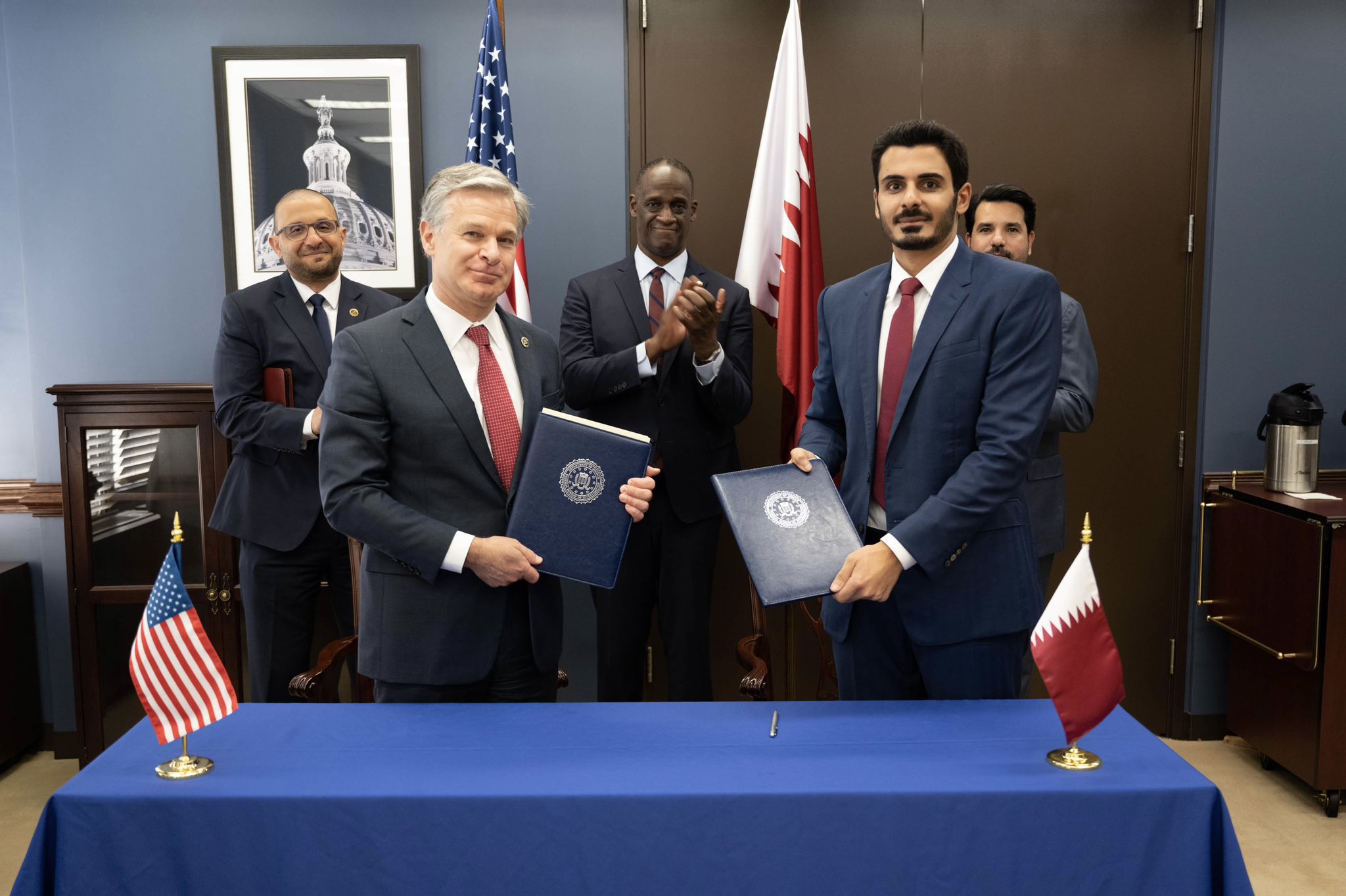Qatar, U.S. to enhance security cooperation under new agreements

Qatar’s minister of interior was in Washington on June 25, where he met the FBI director and other top officials.
Qatar and the United States are enhancing their security cooperation under new agreements as the two countries continue to expand their strategic relations.
The Qatari ministry of interior (MOI) announced the agreements on Sunday, which were signed by Qatar’s Minister of Interior and Commander of the Internal Security Force (Lekhwiya), Sheikh Khalifa bin Hamad bin Khalifa Al Thani, and FBI Director Christopher Wray.
“During the meeting, agreements were signed to enhance security cooperation between Qatar and the United States,” the MOI’s statement said. “A number of topics of common interest were also discussed and the cooperation relations between the two friendly countries in the security fields,” the statement also said.
According to the MOI, the signing took place during “a recent visit” by Sheikh Khalifa.
Qatar’s minister of interior was in Washington on June 25, where he met the FBI director and other top officials, including U.S. Secretary of Homeland Security, Alejandro Mayorkas.
During the meeting, both sides signed a letter of intent over cooperation in securing major sporting events during the 2026 World Cup, which will be divided between the U.S., Canada and Mexico.
Doha and Washington will be exchanging expertise following the former’s success in hosting the 2022 FIFA World Cup, widely described as the best edition of the tournament.
At the time of the major sporting event, a number of Qatar’s international partners helped secure the event, including the U.S., Türkiye, France, the United Kingdom and Italy.
Building on their past experience, Qatar’s Lekhwiya are currently contributing to the security organisation of this summer’s Olympic Games in Paris. The Qatari forces landed in Paris on July 12.
Qatar-U.S. relations
Doha and Washington’s relations witnessed numerous milestones, including in 2018 with the launch of the annual U.S.-Qatar Strategic Dialogue.
The meetings often result in agreements boosting bilateral relations between the two countries. The sixth edition of the annual meeting took place in Washington, D.C. in March.
The Gulf state hosts the Al-Udeid Airbase, the largest American military post in the Middle East. In January, the U.S. agreed to extend its military presence at the base in Qatar for another decade.
In 2022, U.S. President Joe Biden designated Qatar as a Major Non-NATO Ally (MNNA) as he met with Qatar’s Amir Sheikh Tamim bin Hamad Al Thani in Washington, D.C.
The designation grants Washington’s foreign partners several benefits in areas concerning defence trade and security cooperation. Qatar became the third Gulf country to be added to the list of 18 current MNNA’s, which already included Bahrain and Kuwait.
Biden, who pulled out of the upcoming U.S. elections on Sunday, had noted that the designation was a recognition of Qatar’s role as a reliable ally, given its major efforts in 2021 in light of the Taliban takeover of Kabul.
At the time, Qatar and the U.S. cooperated in mass evacuations of more than 80,000 Afghans and foreigners, which became known as history’s largest airlift of people.
Beyond Afghanistan, Qatar has played several critical diplomatic efforts in issues concerning the U.S.
In September 2023, Qatar’s mediation led to a milestone prisoner deal between Washington and Tehran that was a result of a two-year diplomatic effort.
Last December, Qatar’s mediation resulted in a prisoner exchange deal of 11 prisoners between the U.S. and Venezuela. The swap marked the largest release of U.S. prisoners in Venezuela’s history, according to the Associated Press.
Currently, Qatar is playing a central role in efforts aimed at securing a ceasefire and a captives release deal between Israel and Hamas. The Gulf state has hosted the Hamas political office since 2012 under Washington’s request to maintain an open channel of communications.
Related
Qatar emphasizes importance of reaching agreement between US, Iran
CAIROQatar's Prime Minister Sheikh Mohammed bin Abdulrahman Al-Thani stressed the critical need for an agreement between the US and
International Women’s Day: Seeking a Balance with Ghada Al Subaey
1309’s Ghada Al Subaey of Qatar celebrates the many layers of femininity in her recent drop, called Labyrinth of Light. This International Women’s Day, the
Discover Ooredoo Plans and Services in Qatar
Ooredoo is the household name in the field of telecommunications and provides a full portfolio of telecom services: mobile plans for everyone, home
What Will The Imminent Qatar Airways Widebody Order Include?
Which Airline Alliance Do You Prefer To Fly With?












